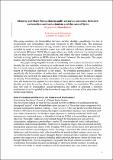Files in this item
Identity and state formation in multi-sectarian societies : between nationalism and sectarianism in Syria
Item metadata
| dc.contributor.author | Hinnebusch, Raymond | |
| dc.date.accessioned | 2021-12-28T00:37:49Z | |
| dc.date.available | 2021-12-28T00:37:49Z | |
| dc.date.issued | 2020-01 | |
| dc.identifier | 260576967 | |
| dc.identifier | d5f430ef-4a7b-4ff8-a67b-d50f8211d081 | |
| dc.identifier | 85077356770 | |
| dc.identifier | 000505276000009 | |
| dc.identifier.citation | Hinnebusch , R 2020 , ' Identity and state formation in multi-sectarian societies : between nationalism and sectarianism in Syria ' , Nations and Nationalism , vol. 26 , no. 1 , pp. 138-154 . https://doi.org/10.1111/nana.12582 | en |
| dc.identifier.issn | 1354-5078 | |
| dc.identifier.other | ORCID: /0000-0001-5800-6606/work/67167080 | |
| dc.identifier.uri | https://hdl.handle.net/10023/24584 | |
| dc.description.abstract | The relation between state formation and identity in MENA multi‐sectarian societies is examined, taking Syria as a case study. The paper looks at the impact of the mix of sectarianism and nationalism on the formation of state institutions and the impact of the latter on this mix. The flawed export of the Westphalian state system to MENA established the structural context—multiple identities, hybrid states—wherein the two identities compete, overlap, and coexist. Next, the factors that explain varying identity patterns in MENA are surveyed and their likely consequences for state formation; then, reversing the analysis, the impact of state formation and state institutions on the nationalism–sectarianism balance is examined. The Syrian case is briefly discussed in order to illustrate the argument, looking at three periods when the identity balance interacted differently with state formation: pre‐Ba'thist Syria when nationalism eclipsed sectarianism; Ba'thist Syria (1970‐2000) when patrimonial instrumentalization of sectarianism was compensated for by inclusive bureaucratic institutions, populist policies, and nationalist ideology; neo‐liberal Syria under Bashar al‐Asad (2000‐2010) when inclusion shrank, reanimating sectarianism; and civil war Syria (2010‐) when partial state failure fostered exclusionary militant sectarianism at the expense of nationalism. | |
| dc.format.extent | 17 | |
| dc.format.extent | 322583 | |
| dc.language.iso | eng | |
| dc.relation.ispartof | Nations and Nationalism | en |
| dc.subject | Ba'th Party | en |
| dc.subject | Identity | en |
| dc.subject | Nationalism | en |
| dc.subject | Sectarianism | en |
| dc.subject | State formation | en |
| dc.subject | Syria | en |
| dc.subject | JZ International relations | en |
| dc.subject | JQ Political institutions Asia | en |
| dc.subject | T-NDAS | en |
| dc.subject.lcc | JZ | en |
| dc.subject.lcc | JQ | en |
| dc.title | Identity and state formation in multi-sectarian societies : between nationalism and sectarianism in Syria | en |
| dc.type | Journal article | en |
| dc.contributor.institution | University of St Andrews. School of International Relations | en |
| dc.identifier.doi | https://doi.org/10.1111/nana.12582 | |
| dc.description.status | Peer reviewed | en |
| dc.date.embargoedUntil | 2021-12-28 |
This item appears in the following Collection(s)
Items in the St Andrews Research Repository are protected by copyright, with all rights reserved, unless otherwise indicated.

